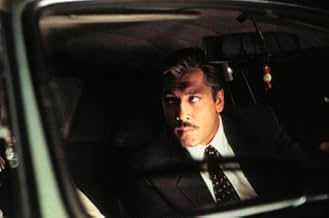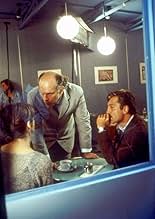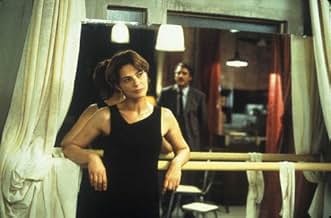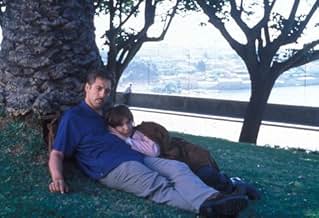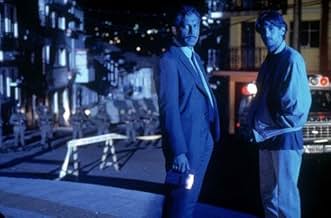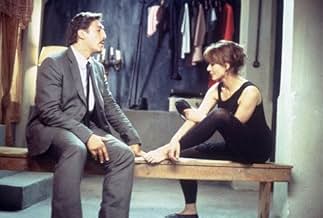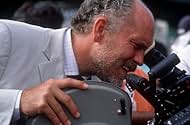NOTE IMDb
6,8/10
7,1 k
MA NOTE
Un détective de police dans un pays d'Amérique du Sud se consacre à traquer un chef de guérilla révolutionnaire.Un détective de police dans un pays d'Amérique du Sud se consacre à traquer un chef de guérilla révolutionnaire.Un détective de police dans un pays d'Amérique du Sud se consacre à traquer un chef de guérilla révolutionnaire.
- Réalisation
- Scénario
- Casting principal
- Récompenses
- 1 victoire et 3 nominations au total
Avis à la une
Acclaimed actor John Malkovich has made his directorial debut with an assured political thriller that combines tension and intelligence to make for a gripping two and a quarter hours. The setting is a South American country which is unnamed, but the clear inspiration for the storyline is the early 1990s experience of Peru (which I have recently visited) when the bizarre Abimael Guzman led the murderous Shining Path movement, while the movie was shot in Spain, Portugal and Ecuador.
Javier Bardem plays Augustin Rejas, a former lawyer turned policeman who manages rare dignity and honesty as he battles with the interventions of a regime teetering on the edge of a military dictatorship and the pursuit of a fanatical revolutionary codenamed Ezekiel, while struggling with the varying emotions associated with a vapid wife, an adoring daughter, and his daughter's dance teacher, the eponymous and allurring woman upstairs (Laura Morante as Yolanda). Bardem - who reminds me of an early Raul Julia - gives a languid yet charismatic performance and hopefully we will see much more of this talented actor.
In some respects the work is reminiscent of Costa-Gavras's "State Of Siege", a clip of which is actually used here. However, the movie is based on a novel by the British writer Nicholas Shakespeare, who wrote the screenplay which features some conversation in Quechua (a native language of Peru and Bolivia), and this is a more personal examination of terrorism than the 1973 movie.
Javier Bardem plays Augustin Rejas, a former lawyer turned policeman who manages rare dignity and honesty as he battles with the interventions of a regime teetering on the edge of a military dictatorship and the pursuit of a fanatical revolutionary codenamed Ezekiel, while struggling with the varying emotions associated with a vapid wife, an adoring daughter, and his daughter's dance teacher, the eponymous and allurring woman upstairs (Laura Morante as Yolanda). Bardem - who reminds me of an early Raul Julia - gives a languid yet charismatic performance and hopefully we will see much more of this talented actor.
In some respects the work is reminiscent of Costa-Gavras's "State Of Siege", a clip of which is actually used here. However, the movie is based on a novel by the British writer Nicholas Shakespeare, who wrote the screenplay which features some conversation in Quechua (a native language of Peru and Bolivia), and this is a more personal examination of terrorism than the 1973 movie.
The film's trailer, which rain endlessly for months in advance at my local art house, and the reviews, etc., have emphasized this as a political thriller. But in fact it's really in the tradition of "Casablanca," where politics is a constant background to only part of the hero's motivation. I did expect someone to say "Round up the usual suspects!"
Awkwardly in this day and age, the Latino actors in the film's unnamed Latin American country (it was filmed in Ecuador and Madrid) all speak (accented) English, with subtitles to indicate when characters are speaking an Indian dialect, i.e. when the hero lawyer/detective is using his heritage to solve the complex case of politically-motivated murders.
But it's the complex layers that make this more interesting than Costa-Gavras' didactic "State of Siege" that is repeatedly referred to as an inspiration, both to director John Malkovich and the revolutionaries, and making this akin to HBO's "The Wire" in showing how a flawed cop can stick to his professionalism amidst deadly-serious bureaucratic and real politics.
The cop's simplistically drawn Beverly Hills matron-type wife turns out to incidentally help him uncover a clue, as he gradually comprehends the cynicism of a revolution that uses unexpected types of cells for suicide missions, with resonance for the MidEast as well, as ideologues are more diabolically dangerous than criminals.
That the dancer is actually downstairs is emblematic of the film's genre confusion.
Awkwardly in this day and age, the Latino actors in the film's unnamed Latin American country (it was filmed in Ecuador and Madrid) all speak (accented) English, with subtitles to indicate when characters are speaking an Indian dialect, i.e. when the hero lawyer/detective is using his heritage to solve the complex case of politically-motivated murders.
But it's the complex layers that make this more interesting than Costa-Gavras' didactic "State of Siege" that is repeatedly referred to as an inspiration, both to director John Malkovich and the revolutionaries, and making this akin to HBO's "The Wire" in showing how a flawed cop can stick to his professionalism amidst deadly-serious bureaucratic and real politics.
The cop's simplistically drawn Beverly Hills matron-type wife turns out to incidentally help him uncover a clue, as he gradually comprehends the cynicism of a revolution that uses unexpected types of cells for suicide missions, with resonance for the MidEast as well, as ideologues are more diabolically dangerous than criminals.
That the dancer is actually downstairs is emblematic of the film's genre confusion.
A curious but not entirely unexpected idiossyncratic choice from John Malkovich for his directing debut, this adaptation of Nicholas Shakespeare's novel fictionalising the capture of the leader of the Peruvian Shining Path revolutionary movement is a more pensive, less political throwback to the European "political thrillers" of the 1970s made popular by directors such as Costa-Gavras. Malkovich, however, dislocates the film's centre from politics into personal mores, following the story of Javier Bardem, as the police detective assigned to discover the whereabouts of the mysterious terrorist leader "Ezequiel". In a superbly controlled performance, Bardem emphasizes the vulnerability of this disenchanted, seen-it-all cop thrown against his will into the frying-pan and the way he attempts to maintain his dignity and uphold the law he no longer believes in. Malkovich proves an engaging director - despite its lengthy running time (and although it could use a slight trim), the film is neither predictable nor overstays its welcome, and the actors deliver consistently good performances. One wishes Malkovich had looked for a better story to tell, but as debuts go this is a promising one.
'The Dancer Upstairs' marks John Malkovich's debut as a film director, but it's hardly his first time in the director's chair: Malkovich was a charter member of the now-prestigious Steppenwolf Theater Company in Chicago, where he split time between acting and directing, developing the versatility that has earned him regard as one of the best character actors in the business. He brings a stage director's consciousness to this fine, unexpectedly suspenseful and complex thriller, a fictionalized dramatization of events surrounding the rise and fall of the Shining Path revolutionary movement in Peru.
In the lead role of Detective Augustin Rejas is Javier Bardem, already an established star in his native Spain who is gaining increasingly wide notice in the US for his award-winning turns in Julian Schnabel's 'Before Night Falls' (2002) and Alejandro Amenabar's 'The Sea Inside' (2004). Bardem, like Malkovich, is a wonderfully versatile actor, and this film offers him another fine opportunity to display his range as Rejas, an idealistic police detective who abandoned a promising career as a trial lawyer in the hope that he might be able to work within the system to heal the corruption of his native country (left unnamed, though the story clearly borrows from actual events in Peru).
The film opens on the high plains at the foothills of the Andes, with Rejas working at a highway checkpoint station. He encounters a vehicle bearing a mysterious undocumented passenger. While Rejas follows procedure, his colleague accepts a bribe, and allows the vehicle to flee the scene.
Years later, Rejas has advanced through the ranks and now works as a detective in the nation's coastal capital. He and his partner Sucre (Juan Diego Botto, making the most of a small role) gradually begin to discover evidence of a burgeoning revolutionary movement led by the enigmatic 'Presidente Ezequiel,' whom Rejas eventually realizes to be the same man he met briefly years earlier at the mountain checkpoint. The followers of Ezequiel--a former college professor and Marxist who went underground ten years earlier to foment a 'fourth wave' of communist revolution (the first three being the USSR, China, and Cuba)--begin to terrorize the capital and outlying regions with suicide bombings and brutal assassinations. Rejas must uncover the secret of Ezequiel before the President enacts martial law and turns the government into another version of the brutal dictatorships previously seen in Bolivia, Chile, and Argentina.
As the Ezequiel mystery deepens, Rejas begins to develop an infatuation with his daughter's ballet instructor, Yolanda (Laura Morante), with who he shares an unspoken bond and who seems to be an attractive alternative to his own wife (Alexandre Lencastre), a sweet but superficial woman who obsesses over fashion magazines and makeup and begs her perpetually broke husband to let her get a nose job. Rejas begins to court Yolanda, and as he becomes more deeply involved with her, he begins to discover evidence that she may be knowingly or unknowingly connected in some way to Ezequiel.
The political dimension of the story is fascinating, but the main source of conflict is the interior world of Rejas, a sensitive, morally decent man who is torn between his faith in the law and his sympathy for the people who suffer at the hands of corrupt government officials. Rejas is also torn between his sense of honor and decency and his profound emotional attraction to Yolanda. It's a tough role to pull off, and Malkovich gives Bardem the time and opportunity to draw the character's emotional complexity with subtle, patient, expressive moments and line deliveries. Bardem has the rare ability to convey distinct emotions or states of thought with subtle gestures and nuanced facial expressions, and Malkovich demonstrates an actor's trust in another gifted actor to accomplish the film's emotional subtext.
There are a few problems here and there. Rejas' attraction to Yolanda is understandable, but their burgeoning relationship feels a bit forced and underdeveloped at times. A subplot involving the Chinese embassy is introduced but left more or less unresolved. The plot is vaguely predictable, though, in the film's defense, the suspense has more to do with how Rejas will deal with the revelations his investigation will uncover than with what will actually be revealed.
Even with the flaws, 'The Dancer Upstairs' is a highly intelligent and entertaining film, and offers yet another opportunity for American audiences to become acquainted with the fabulously talented Javier Bardem, who is my pick to be the next Marlon Brando.
In the lead role of Detective Augustin Rejas is Javier Bardem, already an established star in his native Spain who is gaining increasingly wide notice in the US for his award-winning turns in Julian Schnabel's 'Before Night Falls' (2002) and Alejandro Amenabar's 'The Sea Inside' (2004). Bardem, like Malkovich, is a wonderfully versatile actor, and this film offers him another fine opportunity to display his range as Rejas, an idealistic police detective who abandoned a promising career as a trial lawyer in the hope that he might be able to work within the system to heal the corruption of his native country (left unnamed, though the story clearly borrows from actual events in Peru).
The film opens on the high plains at the foothills of the Andes, with Rejas working at a highway checkpoint station. He encounters a vehicle bearing a mysterious undocumented passenger. While Rejas follows procedure, his colleague accepts a bribe, and allows the vehicle to flee the scene.
Years later, Rejas has advanced through the ranks and now works as a detective in the nation's coastal capital. He and his partner Sucre (Juan Diego Botto, making the most of a small role) gradually begin to discover evidence of a burgeoning revolutionary movement led by the enigmatic 'Presidente Ezequiel,' whom Rejas eventually realizes to be the same man he met briefly years earlier at the mountain checkpoint. The followers of Ezequiel--a former college professor and Marxist who went underground ten years earlier to foment a 'fourth wave' of communist revolution (the first three being the USSR, China, and Cuba)--begin to terrorize the capital and outlying regions with suicide bombings and brutal assassinations. Rejas must uncover the secret of Ezequiel before the President enacts martial law and turns the government into another version of the brutal dictatorships previously seen in Bolivia, Chile, and Argentina.
As the Ezequiel mystery deepens, Rejas begins to develop an infatuation with his daughter's ballet instructor, Yolanda (Laura Morante), with who he shares an unspoken bond and who seems to be an attractive alternative to his own wife (Alexandre Lencastre), a sweet but superficial woman who obsesses over fashion magazines and makeup and begs her perpetually broke husband to let her get a nose job. Rejas begins to court Yolanda, and as he becomes more deeply involved with her, he begins to discover evidence that she may be knowingly or unknowingly connected in some way to Ezequiel.
The political dimension of the story is fascinating, but the main source of conflict is the interior world of Rejas, a sensitive, morally decent man who is torn between his faith in the law and his sympathy for the people who suffer at the hands of corrupt government officials. Rejas is also torn between his sense of honor and decency and his profound emotional attraction to Yolanda. It's a tough role to pull off, and Malkovich gives Bardem the time and opportunity to draw the character's emotional complexity with subtle, patient, expressive moments and line deliveries. Bardem has the rare ability to convey distinct emotions or states of thought with subtle gestures and nuanced facial expressions, and Malkovich demonstrates an actor's trust in another gifted actor to accomplish the film's emotional subtext.
There are a few problems here and there. Rejas' attraction to Yolanda is understandable, but their burgeoning relationship feels a bit forced and underdeveloped at times. A subplot involving the Chinese embassy is introduced but left more or less unresolved. The plot is vaguely predictable, though, in the film's defense, the suspense has more to do with how Rejas will deal with the revelations his investigation will uncover than with what will actually be revealed.
Even with the flaws, 'The Dancer Upstairs' is a highly intelligent and entertaining film, and offers yet another opportunity for American audiences to become acquainted with the fabulously talented Javier Bardem, who is my pick to be the next Marlon Brando.
Actor John Malkovich makes an auspicious directorial debut with `The Dancer Upstairs,' an intriguing, if not altogether satisfying, police procedural set in an unnamed Latin American country.
Javier Bardem (`Night Must Fall') gives a richly textured performance as Detective Augustin Rejas, a man of principle and ethics operating in a world of corruption and violence. Rejas finds himself embroiled in a life-and-death mystery when he investigates an underground terrorist organization that is targeting key government officials for assassination. Who these people are is not at all clear to those in charge and even their motives can only be guessed at. As Rejas studies the clues in search of answers, he becomes drawn to a beautiful young dance teacher with whom he establishes a platonic yet highly charged romantic relationship. It is in the bringing together of these two seemingly disparate plot lines that the movie fails, ultimately, to satisfy. For roughly the first three quarters of the film, as Rejas collects his evidence and unravels the puzzle, we gladly go along where the filmmakers are taking us, fascinated by the setting, the atmosphere and the contemporary relevance of the terrorism theme. But when, towards the end, the story kicks into high tragedy mode, the movie loses us, partly because the plotting itself is not particularly credible and partly because the relationship between Rejas and the woman has not been sufficiently developed to achieve the status of genuine tragedy. The film is much better when it sticks to the business of the case and leaves all the existential navel-gazing out of the mix.
This is not to demean either the moving, beautifully modulated performance of Bardem or the stark, self-assured direction of Malkovich, who shows he knows how to function as well behind the camera as he does in front. True, the film is a trifle slow at times but this just shows that Malkovich will not be rushed when the material itself demands deliberation and care. Although the movie is about a half hour too long, real languor begins to set in only during the final stretches. Until then, `The Dancer Upstairs' makes for rewarding viewing.
Javier Bardem (`Night Must Fall') gives a richly textured performance as Detective Augustin Rejas, a man of principle and ethics operating in a world of corruption and violence. Rejas finds himself embroiled in a life-and-death mystery when he investigates an underground terrorist organization that is targeting key government officials for assassination. Who these people are is not at all clear to those in charge and even their motives can only be guessed at. As Rejas studies the clues in search of answers, he becomes drawn to a beautiful young dance teacher with whom he establishes a platonic yet highly charged romantic relationship. It is in the bringing together of these two seemingly disparate plot lines that the movie fails, ultimately, to satisfy. For roughly the first three quarters of the film, as Rejas collects his evidence and unravels the puzzle, we gladly go along where the filmmakers are taking us, fascinated by the setting, the atmosphere and the contemporary relevance of the terrorism theme. But when, towards the end, the story kicks into high tragedy mode, the movie loses us, partly because the plotting itself is not particularly credible and partly because the relationship between Rejas and the woman has not been sufficiently developed to achieve the status of genuine tragedy. The film is much better when it sticks to the business of the case and leaves all the existential navel-gazing out of the mix.
This is not to demean either the moving, beautifully modulated performance of Bardem or the stark, self-assured direction of Malkovich, who shows he knows how to function as well behind the camera as he does in front. True, the film is a trifle slow at times but this just shows that Malkovich will not be rushed when the material itself demands deliberation and care. Although the movie is about a half hour too long, real languor begins to set in only during the final stretches. Until then, `The Dancer Upstairs' makes for rewarding viewing.
Le saviez-vous
- AnecdotesThe story is inspired by the Maoist insurgency in Peru known as the Shining Path. Its leader Abimael Guzmán, who was known by the nom de guerre President Gonzalo, was captured in an apartment above a ballet studio in the capital city of Lima in 1992. The ballet teacher Yolanda was based on Maritza Garrido Lecca, the woman in whose apartment Guzmán was found. Bardem's character was inspired by Benedicto Jimenez and Gen. Antonio Ketin Vidal, the leading figures responsible for Guzmán's capture.
- GaffesWhen Sucre & Llosa arrest the young woman in orange, she has been handcuffed to the ceiling of the car. But then en route, soldiers simply drag her out of the backseat. No handcuff keys. No bolt cutters.
- Citations
Agustín Rejas: I'd like to have a list of staff with access to the President's chambers.
Calderón: Luckily there are only two of them. The first is named 'Fuck', the second is named 'Off'.
- Crédits fousThe producers would like to thank ... the residents of Narcisos Street ...
- ConnexionsFeatured in Revealing 'The Dancer Upstairs' (2003)
- Bandes originalesViagens Interditas
(1995)
Written by Pedro Malgheas (as Pedro Ayres) and Rodrigo Leão
Performed by Madredeus
Licensed by Dpte. de Productos Especiales de
(p) EMI Odean, S.A., Madrid, Spain, 2001 exclusive rights holder
Meilleurs choix
Connectez-vous pour évaluer et suivre la liste de favoris afin de recevoir des recommandations personnalisées
- How long is The Dancer Upstairs?Alimenté par Alexa
Détails
Box-office
- Montant brut aux États-Unis et au Canada
- 2 377 348 $US
- Week-end de sortie aux États-Unis et au Canada
- 106 142 $US
- 4 mai 2003
- Montant brut mondial
- 5 227 348 $US
- Durée2 heures 12 minutes
- Couleur
- Mixage
- Rapport de forme
- 1.85 : 1
Contribuer à cette page
Suggérer une modification ou ajouter du contenu manquant

Lacune principale
By what name was Dancer Upstairs (2002) officially released in Canada in English?
Répondre


